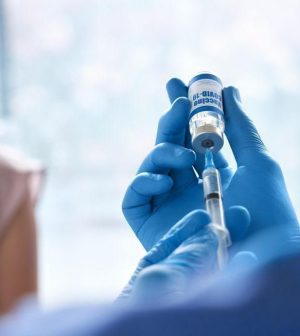- 10 Strategies to Overcome Insomnia
- Could Artificial Sweeteners Be Aging the Brain Faster?
- Techniques for Soothing Your Nervous System
- Does the Water in Your House Smell Funny? Here’s Why
- Can a Daily Dose of Apple Cider Vinegar Actually Aid Weight Loss?
- 6 Health Beverages That Can Actually Spike Your Blood Sugar
- Treatment Options for Social Anxiety Disorder
- Understanding the Connection Between Anxiety and Depression
- How Daily Prunes Can Influence Cholesterol and Inflammation
- When to Take B12 for Better Absorption and Energy
Moderna CEO Says 4th COVID Dose May Be Needed Next Fall

A fourth COVID shot may be needed for most people by next fall because of what will likely be waning immunity, Moderna CEO Stephane Bancel said Thursday.
While the booster that millions of Americans received this past fall should hold strong through this winter’s Omicron surge, Bancel said the efficacy of boosters will probably decline over the course of several months, similar to what happened with the first two doses.
“I will be surprised when we get that data in the coming weeks that it’s holding nicely over time — I would expect that it’s not going to hold great,” Bancel said of the booster shots during an interview with Goldman Sachs during its healthcare CEO conference, CNBC reported.
Governments, including the U.K. and South Korea, are already ordering the doses in preparation, he added.
“I still believe we’re going to need boosters in the fall of ’22 and forward,” Bancel said, adding that people who are older or have underlying health conditions might need annual boosters for years to come.
“We have been saying that we believe first this virus is not going away,” Bancel noted. “We’re going to have to live with it.”
Moderna published preliminary data last month that showed its currently authorized 50 microgram booster shot increased the antibodies that block infection from Omicron 37-fold. A 100 microgram booster increased those antibodies 83-fold.
Meanwhile, data from the United Kingdom found that Moderna and Pfizer’s two-dose vaccines are only about 10% effective at preventing symptomatic infection from Omicron 20 weeks after the second dose, CNBC reported.
The same study, published by the U.K. Health Security Agency, found that booster doses are up to 75% effective at preventing symptomatic infection two weeks after receiving the shot.
But the strength of the booster shots starts to wane after about four weeks, the study found. Boosters were 55% to 70% effective at preventing infection at weeks five to nine, and 40% to 50% effective 10 weeks after receiving the shot.
Moderna’s vaccine isn’t the only one that may entail a fourth dose at some point.
Pfizer CEO Albert Bourla told CNBC last month that people will likely need a fourth dose, and the shot may be needed sooner than expected due to Omicron’s virulence.
Still, Bancel sounded a positive note on Thursday, saying Omicron could accelerate the transition from the acute crisis caused by the coronavirus to a phase where enough people have some level of immunity so that COVID-19 no longer upends daily life.
But, “what is totally impossible to predict, is there a new mutation coming in a day, a week, three months that is worse in terms of severity of disease,” he added. “That’s a piece that we’ll have to just be cautious about.”
More information
Visit the U.S. Centers for Disease Control and Prevention for more on boosters.
Source: HealthDay
Copyright © 2026 HealthDay. All rights reserved.










